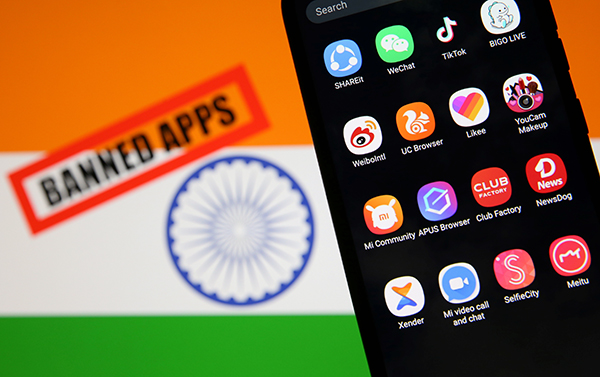
India banned 54 Chinese apps that pose threat to the country’s security, the ministry of electronics and information technology said today. “These 54 apps allegedly obtain various critical permissions and collects sensitive user data. These collected real-time data are being misused and transmitted to servers located in hostile country,” the ministry said in a statement.
The list of banned apps include – Sweet Selfie HD, Beauty Camera – Selfie Camera, Garena Free Fire – Illuminate, Viva Video Editor, Tencent Xriver, Onmyoji Arena, AppLock and Dual Space Lite. India has blocked 321 apps since border tensions with China in May 2020.
In June last year, India banned 59 Chinese mobile applications including the widely-used social media platforms such as TikTok, WeChat, and Helo citing a threat to the nation’s sovereignty and security. The apps were banned under Section 69A of the Information Technology Act, the Ministry of Electronics and Information Technology said.
The first round of bans was announced in June 2020, days after 20 Indian soldiers were killed in a clash with Chinese troops at Galwan Valley in eastern Ladakh. The tension had escalated following a deadly clash in the Galwan Valley on June 15 that year.
The eastern Ladakh border standoff between the Indian and Chinese militaries erupted on May 5, 2020, following a violent clash in the Pangong Lake areas and both sides gradually enhanced their deployment by rushing in tens of thousands of soldiers as well as heavy weaponry.
“It is good if we are attacked by the enemy, since it proves that we have drawn a clear line of demarcation between the enemy and ourselves. It is still better if the enemy attacks us wildly and paints us as utterly black and without a single virtue; it demonstrates that we have not only drawn a clear line of demarcation between the enemy and ourselves but achieved a great deal in our work.” Thus spake Chairman Mao. China is no longer in Mao’s thrall and follows Xi Jinping thought these days. Still, the notion that it is good to be attacked by the enemy retains its essential sense: it shows you make an impact that calls for countermeasures.
True, the initial ban that India imposed on a clutch of smartphone apps by Chinese companies, including TikTok, the short video app that is both a threat to US tech companies dominant in the business and a shield for them against the charge of unassailable monopoly, did not cause any serious damage to Chinese business. But, expanding the scope of the bans and persisting with them do, it would appear, make an impact.
At a press conference on 17 February, the spokesman for China’s commerce ministry, Gao Feng, expressed concern about India’s ban on Chinese apps.
saying that it hoped India would treat all foreign investors, including Chinese firms, in a transparent, fair and non-discriminatory manner. “We hope India can take concrete measures to maintain the sound development momentum of bilateral economic and trade cooperation,” Gao Feng, spokesman for the Ministry of Commerce, told a press conference.

















